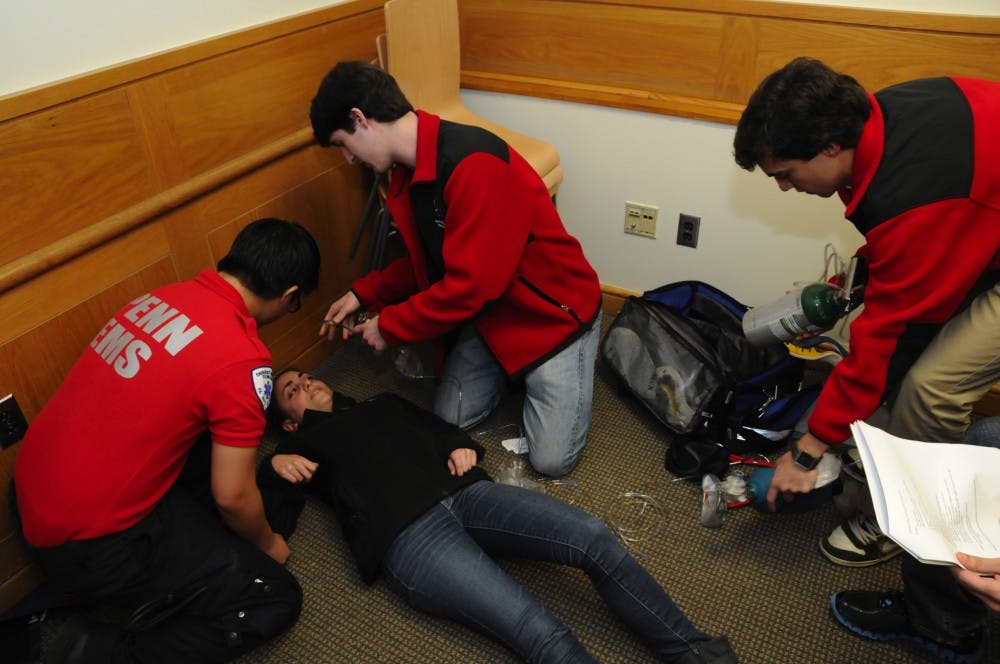
“Ecstasy has clearly come back,” said Julie Lyzinski, director of Penn’s Office of Alcohol and Other Drug Program Initiatives, addressing the 200 students selected for FlingSafe at a recent training session. “About six years ago, this drug was not happening on college campuses.”
With the upcoming appearance of Tiësto and electro-pop group Passion Pit at Friday’s Fling concert, AOD, the Drug and Alcohol Resource Team, FlingSafe and the Medical Emergency Response Team are preparing for a potential increase in the use of Molly, the street name for pure MDMA, also known as ecstasy.
“A lot of it is because of the music,” Lyzinski said. “We are going to have a lot of first-time users this spring.”
According to College senior and Social Planning and Events Committee President Shana Rusonis, “SPEC Concerts’ choice of artists for the Spring Fling concert aims to reflect student demand, and to diversify the genre of the event from years previously. We did not speculate as to whether or not specific acts would elicit any different behaviors at the event.”
She added that at the request of AOD, a preview of Molly was presented during the FlingSafe training process for the first time this year.
“We recognized that this could be a situation that FlingSafe members might encounter,” she said.
Over the past few weeks, AOD has been leading the effort to increase information and education about the use of Molly.
“It is important that students understand how dangerous using ecstasy can be in a concert-like setting,” Lyzinski wrote in an email. “MDMA overdose is not uncommon and is exacerbated by hot environments where a lot of physical activity is going on.”
College junior and Chief of MERT Dan Spielman said he is “preparing for the worst.”
In addition to teaching members how to identify the classic symptoms of being on Molly, Spielman is training staff to identify students once they get off their high, what he calls “certain situations when it can spiral downward.”
A College sophomore who did Molly for the first time during a Deadmau5 concert last September and who will be rolling with a dozen other friends during Fling said the increased MERT training of Molly overdose is a reassuring.
“It’s a relief to know that if god-forbid something happens to me, the medical team is prepped to treat me well,” said the sophomore, who wished to remain anonymous because of the legal implications of his action.
AOD hopes that the increased education surrounding Molly use will benefit students trying the drug for the first time this weekend.
A Wharton freshman who said he could obtain Molly from a brother in his fraternity is on the fence about trying it for the first time.
“I don’t want to wake up and not know where I am or how I got there,” he said. “I can do that with alcohol, but ecstasy is something very different. It’s kind of a leap. Plus it’s illegal.”
The freshman thinks that genre of Friday’s concert lineup may make more students willing to try rolling.
For others, rolling is part of the experience of going to an electronic dance music concert.
An Engineering freshman said he spent $800 on 10 grams of Molly for Fling.
“People usually take 0.3 grams, so that means this is enough for 33 people,” he said, adding that at Penn, the price per gram can go up as high as $120 to $130 before electronic concerts “because dealers know people will be willing to pay more for it.”
An Engineering and Wharton junior described that alcohol and tobacco cannot compare to the feeling of being on Molly.
“It’s a matter of perception,” he said. “It change the way you experience things. Touch is a lot more satisfying, connecting with people is a lot of satisfying. Music sounds much better. Dancing feels much better.”
The junior, who researched ecstasy’s toxicology and side effects before using it for the first time, cautioned students against rolling without educating themselves about it.
“By the time I actually wanted to do it myself, I had a pretty good grasp of what I was getting myself into,” he said.
Lyzinski “highly recommends” that students who are contemplating whether or not to use MDMA think about potential negative side effects. These can include dehydration, muscle tension and nausea, and heavy use can cause kidney or heart failure.
“These are very real possibilities,” she wrote. “The more a student educates him or herself, the better.”
The Daily Pennsylvanian is an independent, student-run newspaper. Please consider making a donation to support the coverage that shapes the University. Your generosity ensures a future of strong journalism at Penn.
DonatePlease note All comments are eligible for publication in The Daily Pennsylvanian.







